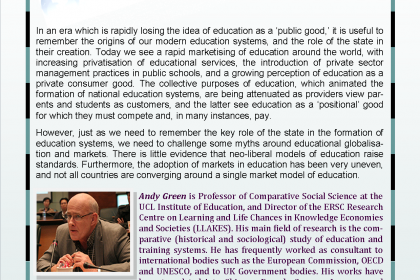Comparative Education Research Centre (CERC)/ Springer
Editors:
Anatoly Oleksiyenko & Liz Jackson
Freedom to teach and freedom to learn (Lehrfreiheit and Lernfreiheit) have become imperatives of research universities that followed the Humboldtian model of higher education and shaped the benchmarks for reputational performance, competition and hierarchical stratification over the last few decades. Freedom and responsibility have become a conflictual dichotomy in the studies of higher education as markets and hierarchies became two major domains shaping and distributing status goods in most societies. Defining a good in the context of international higher learning has become also problematic as freedoms of mobility, inquiry and argument implied strategizing often in disregard of ethics, politics, and social discourses. The literature in the field of global mobility and higher learning has provided a range of examples where advantages for some have been raising anxiety and competition for access to status goods worldwide. Alas, the literature has provided little insight into how freedom of teaching and learning comes into play with social responsibilities in various cultural domains and political systems.
With increasing influence of illiberalism, freedom should not be considered or interpreted lightly. Academic freedom, for example, has never been challenged as much as it is today when the post-truth societies primarily make universities battlefields of politicized emotions and expressions. At the same time, with intelligence commodified, reified or marginalized, the freedom of mobility can entail a fight for entitlements or an escape from local responsibilities. The decline of academic freedom or the absence of forces to defend it are related challenges. These challenges grow as the competition of ideas, sometimes under the rubric of academic freedom, often implies the power struggle and questioning of statuses in the so-called “marketplace of ideas”. Competition per se becomes more important than human dignity, which was originally supposed to expand and strengthen under freedoms to teach and learn. What had been happening to these freedoms across different subject positions and cultures of higher education, remains largely underexplored.
As the waves of globalization encourage rethinking the freedom to teach and the freedom to learn, this project will engage scholars from around the world to rethink the currency of ideas, concepts and practices related to dignity, freedom, independence, and responsibility in higher education. Are there sufficient freedoms to teach and to learn in modern colleges and universities these days? Are they linked effectively with academic responsibilities? Do these freedoms as they are perceived and/or practiced within and across diverse geographic contexts align effectively with requirements to enhance human dignity? How do freedom to teach and freedom to learn get shaped by relationships of students and scholars to each other and to structural aspects of higher education and the marketplace of ideas? What is still missing in the current discourse and applications in classrooms, online spaces, etc.? What are the implications of the presence or absence of these freedoms in the post-truth world, and the expanding illiberalism and hybrid wars? Developing critical responses to these and other questions through comparative research, will enhance our insight into how tensions between freedoms and responsibilities are managed and resolved in this “brave new world.”
We are inviting scholars of comparative and international higher education to participate in the CERC/Springer publication project. We look forward to receiving extended abstracts (circa 800 words) by August 1, 2019.















